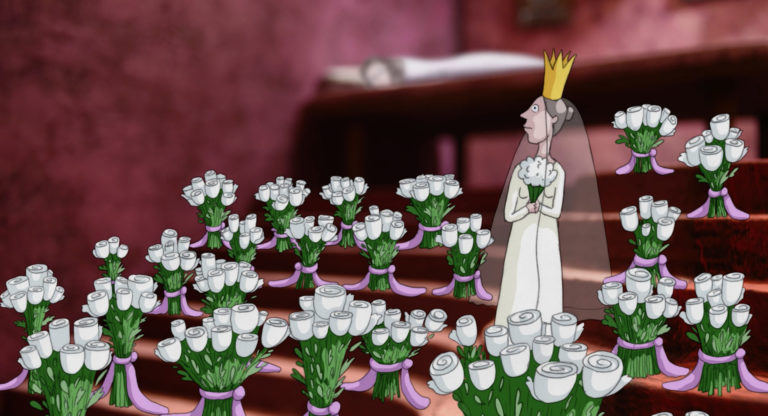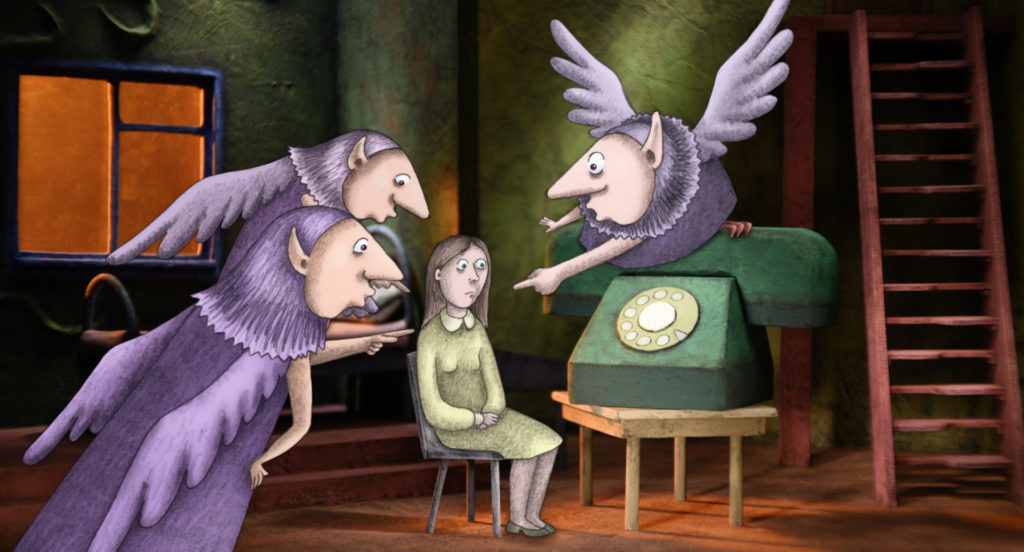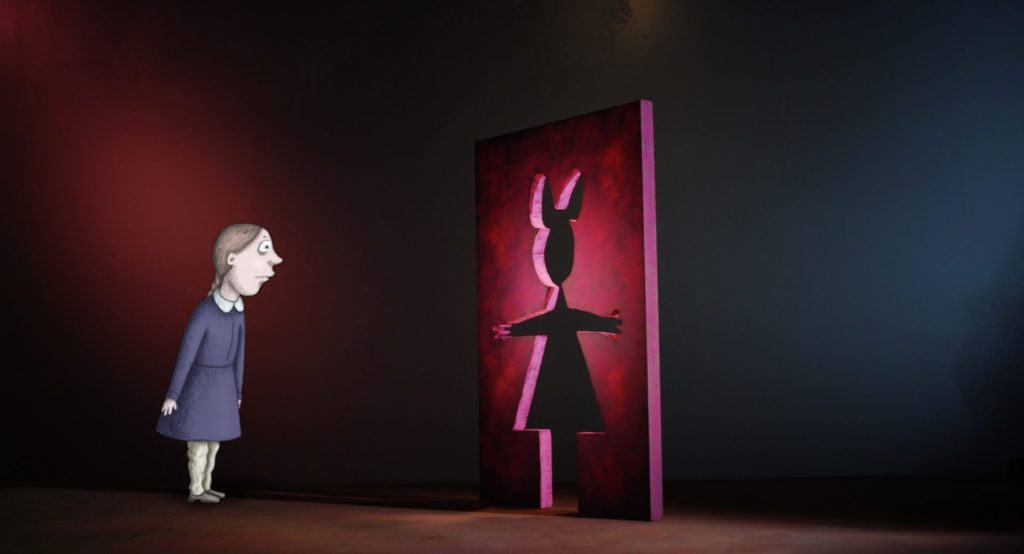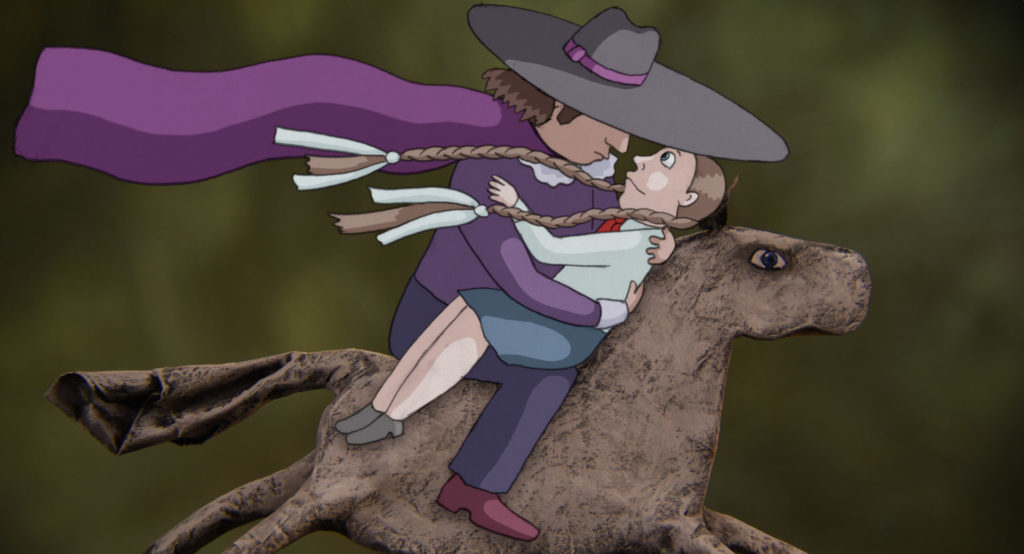
Creating a powerful, relatable feminist story that speaks to women’s fight for autonomy of their bodies and minds is a powerful journey for filmmakers of all cultures. That’s certainly the case for visionary Latvian/New York City-based animator, Signe Baumane, who wrote, directed and produced the new animated movie, My Love Affair with Marriage.
The original animated feature, which uses two-dimensional and stop-motion animation, defies cultural boundaries as it confronts the myth that a woman has to have a husband in order to live a fulfilling life. The filmmaker turned her gaze inward for the feature, which is a semi-autobiographical musical exploration of love, sex, romance and gender as viewed through the lens of neurochemistry.
My Love Affair with Marriage, which approaches the subject with grace and humor, tells the story of Zelma (voiced by Polish-American Succession star, Dagmara Dominczyk), a young, spirited woman who’s stifled by the patriarchal dogma while she’s coming of age. She works throughout her life to perseveres in her search for the meaning of true love, while also exploring who she truly is in the world.
A Greek chorus of Latvian village women and a neuron inside Zelma’s brain connect the film’s multiple thematic threads. She grows from childhood to young adulthood and into middle age, through several marriages and across multiple continents, in search of true love.
Baumane and Dominczyk generously took the time recently to talk over Zoom about scribing, helming and starring in the movie. My Love Affair With Marriage is having its World Premiere in the International Narrative Competition at this month’s Tribeca Festival in New York City.

Q: Signe, you wrote the script for the new animated film, My Love Affair with Marriage, which is based on your own past. What was your inspiration in penning the screenplay, and what was the process like of scribing the story?
SB: I wanted to tell the story about my second marriage. The film is based on my true story; I married a self-identified gender-bending man from Sweden, and I’m from Eastern Europe. The Soviet Union had just collapsed, and Latvia had just gained its independence. So while everything was in despair there, I met this Swedish man. We fell in love very quickly and we married. Then all of these misunderstandings started to happen, and I realized that he has holding a secret.
So I thought it was a very dramatic love story, where you project on each other your desires and wants. There were also the cultural differences that made the story dramatic.
I wanted to find out more about where the desire to get married comes from, so I went back a little bit farther in time. So I started the movie with the first moment that I got the idea that I had to get married to be a complete person, and have a complete, worthy life. So that’s how this whole script first developed.
Along the way, I also decided I wanted to have songs. When I first decided that, I thought I would pick pop songs. But I had to have them be specific to the film’s story, so I wrote specific songs. Then I asked my music collaborator, Kristian Sensini, a genius composer in Italy who composed the songs for my previous film, Rocks in My Pockets, if he could write these songs. He said he could, and he wrote these amazing songs.
I also had to do research into neuroscience for a whole year. That was really difficult because it is a science, and I’m just an artist. The script had 23 drafts, and it took a year and two months to finish it.
Q: Dagmara, you voice the movie’s protagonist of Zelma. What inspired you to appear in the film, and how did you become attached to star in the feature?
DD: What interested me was the script I received. I liked the story from the first page, as this was a world that I was very familiar with; I understood the humor and the female and male characters. I’m also a hopeless romantic, so anything to do with love, whether it’s bumpy or not, gets my attention.
It was a character-driven story, so as an actor, what I get in front of me is the most important thing. This is a story that I feel needs to be told.
Then I started researching who’s going to tell this story, and I wasn’t familiar with Signe’s work. So I watched all of her previous work I could get my hands on, and she sent me links.
I was captivated by this brutal and beautiful honesty she had about what it means to be a woman, and our journey on this earth. The animation was fantastic, bold and bright, but also very dark and Eastern European, in my eyes. So all of it spoke to me immediately; there was no question of, do I want to do this?
Also, we recorded our voices at a studio in New York City (the area where Dominczyk lives), and we worked with this amazing woman there. So we didn’t have to care what we looked like for a week, so we could just show up and be ready to work.
So all of it was very enticing, and the movie, may I dare say, is genius. I’m so glad I went with my gut and did the movie. I’m excited for Signe and the film, and that (it’’ having) this real-life audience.

Q: Signe, in addition to writing My Love Affair with Marriage, you also directed the feature. How did you approach your overall directorial duties during the production?
SB: There are many layers of directing. First of all, directing actors was challenging for me because I’m an animator, but I only get to do animated work once in a blue moon. So for me, working with actors was quite frightening. (Baumane laughed.) I don’t know how directors achieve these amazing performances, and I don’t know how an actor can take the text from the page, and turn it into a real person.
I have seen many times that animators have failed to direct actors, and the performances don’t fully bring out the character. I just wanted to be able to communicate with all these actors, but I felt that I may not have had the experience to do that.
So the film’s casting director and also my partner and co-producer, Sturgis Warner, suggested that he could train me a little bit on how to work with actors. He’s also an actor himself, so we had five sessions so that he can help me develop the ability to communicate with the actors, and I hope that helped.
I also felt that we worked with immensely talented, great actors who needed little guidance to create these amazing characters. So for me, it was a really mind-blowing experience. Now I also understand how characters are created by such talented people. (Baumane laughed.)
But directing the rest of the film was much easier because I’m an animator. The voice track was created before I started animating, so everything was in the voices. So it was Dagmara’s voice with the other actors’ voices in the dialogue, as well as in the voice-over. So everything was together, and I just had to follow this blueprint in my work.
In that way, I can animate in my sleep. (Baumane laughed.) The animation wasn’t as nerve-racking as the process of directing the actors.
The hardest thing about this film, for me, was the constant fundraising because it’s an independent production. We constantly kept running out of money, so we had to keep finding ways to raise more funds.
Dagmara, how did you feel about me directing you during the production?
DD: You’re so generous! It was an act of courage to hand your story and text, without having yet animated it, to a group of strangers, and conduct them in a short amount of time before the visual world was created. That took a lot of guts and tact. We’re both strong Eastern European women, so we got along in that way!
Signe was also very interested and invested in the actors’ processes. You could tell that she’s reliant on what we would bring to it. It was a very mutual need; I would ask her, “Tell me what you need in this scene, as I don’t have the world and other actors.” So she would tell me, “Okay, I need you to do this.” It was a very symbiotic relationship, and we really had to help each other.
SB: Remember, I needed to give you context…and explain why the character was doing or saying things, including the motivation and circumstance. I knew the circumstance because inside my head, I lived there.
DD: I think I understand the characters’ circumstances because I come from a similar part of the world and know similar people; people like Sergei were my friends growing up…so I know their hearts, and had easier access to the humor and circumstances that someone who didn’t come from that part of the world during that time would know. So I think you did give me access to the characters’ inner workings, Signe. I knew what you wanted a lot of the time. So I think that helped.
SB: Yes, very much so.

Q: Like you mentioned earlier, Signe, the Sirens that appear in the movie represent a Greek chorus that remind Zelma of how she should approach her marriages. What was the overall process like of creating one of the film’s most important elements that helped develop the characters and story?
SB: The singing trio, the sirens, represent the story’s messages.
DD: They’re like a Greek chorus, right?
SB: Yes, like a Greek chorus. But my initial intent was to have these pop songs in the film…but then I realized that I needed very specific messages in each song; otherwise, the music wouldn’t work.
Very often, we get our ideas about love and our feelings from songs; when I was growing up, songs told me what love is and how to feel love, and also how to break-up. That’s one of the reasons why I decided that the cultural pressures be by represented by the singing trio. Also, since they’re sirens, they’re trying to lure you in.
Kristian Sensini, the composer who wrote the songs, was very great to work with on the film. It was a very collaborative process. I think he did an amazing job. My favorite song is the end credits song…I feel like it’s an energy of hope and inspiration, so it’s very important to me. It’s different from all of the other songs in the movie, and Kristian did a great job writing it.
Q: My Love Affair with Marriage is having its World Premiere at this month’s Tribeca Festival, in the-International Narrative Competition. What does it mean to you that the movie is premiering at the festival?
SB: Having the movie play at the Tribeca Festival is a great honor, but it’s a world wind right now. We’re constantly trying to get everything ready…Since it’s our hometown festival, we want the cast and whole team to join in on the celebration of this spectacular moment, which comes after seven years of hard work on the film.
So it’s exciting but also nerve-racking, because when you work for seven years on a film, you imagine what it could be. But the moment you put in in front of an audience, that’s the moment of truth; either the audience likes it or they don’t, and they connect with it or they don’t. So I (was) looking forward to, and also dreading, (the premiere screening on June 11). But I made the film for audiences, and (was) looking forward to seeing how audiences react to the film.

